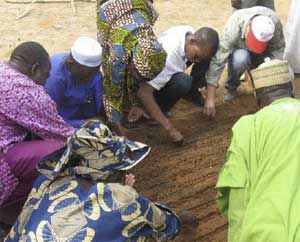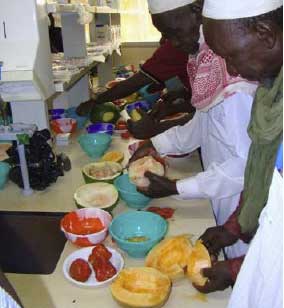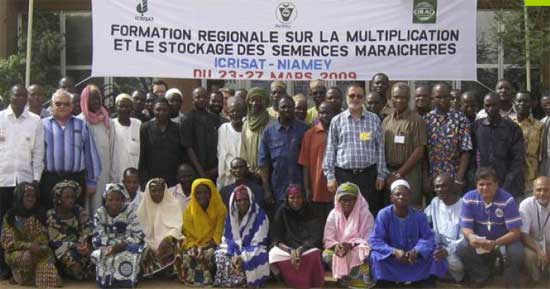|
May 1, 2009
 Source:
AVRDC - The World Vegetable
Center - Newsletter Source:
AVRDC - The World Vegetable
Center - Newsletter
Towards a sustainable vegetable
seed sector in the Sahel
Whether an agricultural production
or seed system is sustainable depends on a variety of factors.
Socioeconomic, political, and infrastructural factors come into
play, but it all begins with high quality seed that is well
adapted to local climatic conditions, and sound seed regulations
and policies. With one of the world’s most fragile ecosystems,
West Africa provides conditions that are a challenge for
sustainable vegetable seed production.
AVRDC – The World Vegetable Center’s project on “Vegetable
Breeding and Seed Systems for Poverty Alleviation in sub-Saharan
Africa” (vBSS) is striving to create a seed system to help
strengthen the vegetable sector and improve the region’s supply
of safe, healthy, and profitable vegetables.
In a “Vegetable Seed
Multiplication and Storage” workshop jointly organized by
AVRDC – The World Vegetable
Center, the International
Crops Research Institute for the Semi-Arid Tropics (ICRISAT)
and Centre de coopération
internationale en recherche agronomique pour le développement
(CIRAD), held in Niamey, Niger from 23–27 March, farmers and
technicians from the region received practical training in the
crucial aspects of vegetable seed production and related
technologies.
 The
workshop was a continuation of a previous workshop on nursery
management held in December 2008. “We received 67 registrations
from Benin, Burkina Faso, Mali, Niger, Senegal and Togo, which
exceeded our initial estimations by far,” says AVRDC vegetable
breeder Dr. Sanjeet Kumar. The high number of participants was The
workshop was a continuation of a previous workshop on nursery
management held in December 2008. “We received 67 registrations
from Benin, Burkina Faso, Mali, Niger, Senegal and Togo, which
exceeded our initial estimations by far,” says AVRDC vegetable
breeder Dr. Sanjeet Kumar. The high number of participants was
all the more remarkable as the costs for the workshop had to be
carried by each participant individually.
The workshop gave participants and instructors ample
opportunities to exchange questions and answers, and
to reflect and learn from the experiences of farmers in other
regions of the Sahel.
“Building capacity is a cornerstone for creating sustainable
impact,” says Dr. Kumar. “Small-scale vegetable seed
production practices at the individual farmer or community level
are very crucial in the Sahel region. Therefore
we tried to show the correlation between vegetable seed
production technology, vegetable production and
vegetable seedling production.”
The acceptance of new technologies is typically greatest when
farmers experience first-hand the benefits the new technology
offers. “For instance, one tomato farmer from Niger reported an
improved seed rate,” explains Dr. Kumar. “He said that a
significantly lower seed rate could be used in his tomato
planting.”
The training provided a module to be included in a larger range
of workshops and courses. The logical next step would be on-farm
training including multilocation testing trials.
“Breeders evaluate and identify genotypes with premium
attributes, typically through multilocation testing,” says the
breeder. “Helping farmers choose the best variety is the first
step to better yields and successful marketing.”
The Center’s recent baseline survey carried out by the vBSS
project provides excellent guidance to select appropriate crops
for the commercial seed industry in West Africa. “We’ve learned
that the public and private
sectors have to play their roles,” says Dr. Kumar. “They
complement each other, and together we can succeed in
building a sustainable vegetable sector in the Sahel, a sector
that offers opportunities and benefits for smallholder farmers,
small seed companies, and consumers.”
|
 |
Vegetable Breeding and Seed
Systems for Poverty Reduction in sub-Saharan Africa (vBSS)
2008, 4 pages
PDF Brochure (537 KB) - English & French
www.avrdc.org
Other news
from
ICRISAT
Other news from
CIRAD |
|